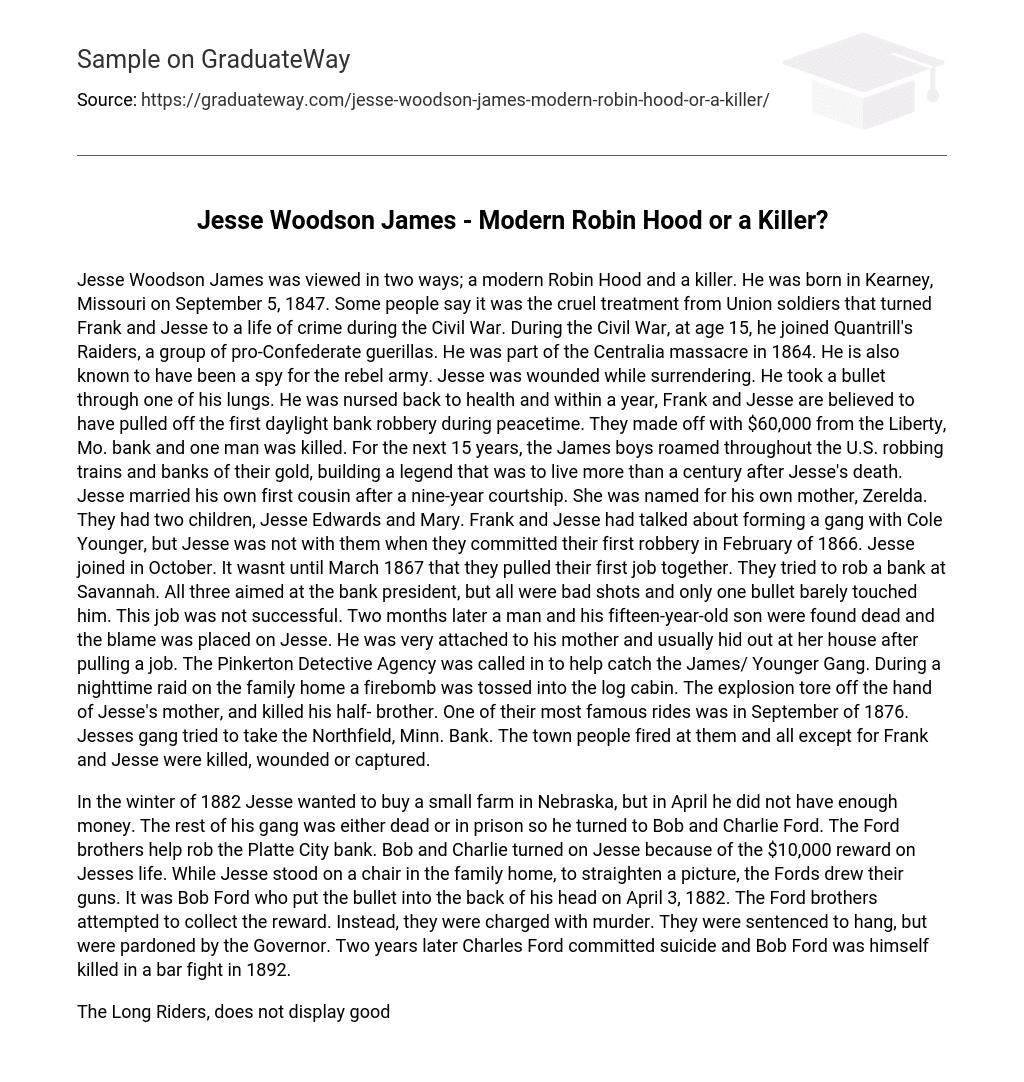Jesse Woodson James, born in Kearney, Missouri on September 5, 1847, was seen from two different perspectives: as a modern Robin Hood and as a killer. Some attribute his turn to a life of crime during the Civil War to the harsh treatment he and his brother, Frank, received from Union soldiers. Joining Quantrill’s Raiders at age 15, Jesse took part in the Centralia massacre in 1864 and served as a spy for the rebel army. However, while surrendering, Jesse sustained a gunshot wound to his lung. After being nursed back to health, he and Frank allegedly carried out the first daytime bank robbery during peacetime, stealing $60,000 from the Liberty, Mo. bank and causing one fatality. Over the next 15 years, the James brothers traveled around the United States, committing robberies of trains and banks and earning themselves a legendary status that endured long after Jesse’s death. Jesse eventually married his first cousin, Zerelda, after a nine-year courtship. They had two children named Jesse Edwards and Mary. Although Jesse had discussed forming a gang with Cole Younger, he was not present when they carried out their initial robbery in February 1866; he did not join them until October of that year. Their first job together occurred in March 1867 when they attempted to rob a bank in Savannah. However, all three were poor shots and only managed to graze the bank president with one bullet.The job was a failure, resulting in loss of life. Months later, both a man and his teenage son were discovered deceased, with Jesse being blamed for their deaths. Jesse had a strong bond with his mother and would often seek refuge at her house following a criminal activity. Seeking assistance, the Pinkerton Detective Agency was brought in to apprehend the James/Younger Gang. In a nighttime assault on their family home, a log cabin was targeted with a firebomb. The explosion caused severe damage, resulting in Jesse’s mother losing her hand and his half-brother losing his life. One of their most famous exploits occurred in September 1876 when the gang attempted to rob the Northfield, Minn. Bank. The townspeople fought back, leaving everyone except Frank and Jesse either killed, wounded, or captured.
In the winter of 1882, Jesse wanted to buy a small farm in Nebraska, but lacked sufficient funds. As the rest of his gang was either deceased or imprisoned, Jesse sought the assistance of Bob and Charlie Ford. The Ford brothers participated in the robbery of the Platte City bank. However, they betrayed Jesse due to the $10,000 reward offered for his capture. While Jesse was standing on a chair in his family home, adjusting a picture, the Fords aimed their guns at him. On April 3, 1882, it was Bob Ford who fired a fatal bullet into the back of Jesse’s head. The Ford brothers hoped to claim the reward but instead were charged with murder. Although they were initially sentenced to hanging, they received a pardon from the Governor. Charles Ford took his own life two years later, while Bob Ford died in a brawl at a bar in 1892.
The historical accuracy of The Long Riders is questionable. One inaccuracy is the portrayal of the Pinkerton’s throwing a bomb into the James’ home through the front window instead of using the back door. Additionally, Jesse James’ half-brother Archie is depicted as a simple-minded teenager rather than a typical nine-year-old boy. Furthermore, Frank James’ surrender to authorities in order to bury Jesse is inaccurately portrayed, as he actually held out for several months.





